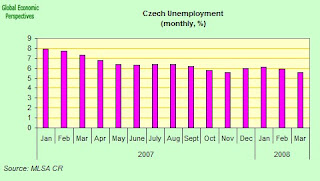
The number of registered unemployed dropped to 336,297, down 18,736 from the preceding month and down 94,177 from a year ago, according to data from the Labor and Social Affairs Ministry this week.

Labour shortages are growing with the number of job vacancies increasing to a record 151,311 at the end of last month.

And employment has also been rising rapidly, with the number of first (main) jobholders in Q4 2007 reaching 4 967.3 thousand, up by 105.6 thousand (+2.2%) year-on-year. Employment thus reached it highest level since the start of 1997.

So with the Czech economy creating jobs at a rate of over 100,000 a year, and with unemployment falling at 95,000 a year, and realistically assuming that not all the 300,000 or so unemployed who remain are employable, then the Czech Republic may be what, 18 months or so away from running out of workers at this point. Of course, long before you actually get to run out of workers, you hit the limits of the inflation-free rate of growth which is possible with the workforce which remains, as we have been seeing in one East European economy after another, (and as we may now even be seeing in China). This is why the recent surge in Czech inflation, despite the slight fall back this month, should be giving cause for concern over at the central bank.
Is Migration The Answer?
Certainly migration can help (as can increasing participation rates among older workers) but the numbers involved are really quite large for a comparatively small country, and there are issues about preparedness to adapt to becoming a multi-cultural society (everything in Eastern Europe is just happening so quickly). But the change is taking place and foreigners now make up almost 4 percent of the Czech Republic's population (which is currently a little over 10 million), and the number of migrant workers in the country has been rising steadily year by year in recent years, and in particular in 2007. According to data from the Czech Statistical Office at the end of last year there were a total of 392,100 foreigners with long-term or permanent residence permits living in the Czech Republic. This was up by 70,600 in 2007 alone.

The largest group of foreign migrants with rights to work in the Czech Republic comes from Slovakia. At the end of last year, 101,233 Slovakians were legally worrking in the country. Ukranians are the second most numerous group with 61,592 working in the Czech Republic last year. The number Mongolian and Vietnamese workers is also increasing rapidly. In 2007 there were 6,897 Mongolians working legally in the CR (up from 2814 in 2006) and 5,4425 Vietnamese (up from 692 in 2006). The numbers of Vientamese in the country is undoubtedly much larger - according to the Czech police, there are almost 51,000 Vietnamese holding long-term or permanent residence permits for the CR, many of these with student visas.
Certainly the Czech Republic's labour shortages are now making their present felt across the economy as a whole. Bloomberg had an in-depth article earlier in the week, where they quoted Jiri Cerny, vice president of Toyot and PSA Peugeot Citroen's joint venture in the Czech Republic, as saying that three years after opening shop in the country he feels it is getting harder by the day to find workers, and he is now actively considering importing them from Mongolia.
TPCA, the Toyota-Peugeot joint venture about an hour outside of Prague, shows the strains created by this new investment. Along with average wage growth of more than 40 percent since the Czech Republic joined the EU in 2004, managers like Cerny also face a labor shortage that means they can't recruit all the workers they need just by offering higher pay.
"It's difficult; we are always looking for employees," says Cerny, wearing the plant's trademark gray overalls as he bounces between budget meetings and the factory floor. To find qualified workers, "we're thinking about Vietnam right now, as well as Mongolia," he says.
This story is being repeated in one country after another as companies that were attracted to the formerly communist nations in eastern Europe by the promise of cheap and plentiful labor are finding less of both, as faster growth drives up wages and open borders encourage emigration. Indeed there is increasing speculation that accelerating inflation may cause eastern Europe's investment- led boom to fizzle (and possibly even crash to a dead stop), with the Baltics and Balkans regions already threatened by a "hard landing" according to the International Monetary Fund and Standard & Poor's.
Of course in the short term migration can help, but in the longer run sustainability is going to be all about getting that fertility rate back up again.














No comments:
Post a Comment